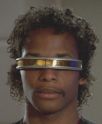|
ashpanash posted:Correction here - things moving at the speed of light don't travel infinite distance in 0 time. They travel 0 distance in 0 time. Space and time are inextricably liked together. To experience 0 time would necessitate experiencing 0 space. And that is exactly what happens - the universe becomes two-dimensional in the direction of travel (to the extent that we can take a limit of an object approaching the speed of light, that is - mathematically speaking, an object at the speed of light *has no* reference frame at all). Thanks for the correction. This is due to the effect where space along the photon's path contracts to 0 at the speed of light, right? I think the point I was trying to illustrate still stands: FTL as its commonly understood (in that it doesn't violate causality), requires the belief that you can conceivably travel through space without traveling through time (which is the exact same mistake I made in my earlier example). Its easy and natural to believe this when everything we experience is on the planet Earth, however when you start looking at distances as close by as geostationary orbit we find this understanding of the universe is completely untrue. Let me try to fix my example: From a photon's point of view, in its travel from Earth to Alpha Centauri, no time passes at all and it moves no distance. From our perspective on Earth, the photon has a travel time of over 4 years. Just like the photon, the perfect FTL spaceship sees itself travel from Earth to Alpha Centauri with no time being passed or distance traveled at all. From our perspective on Earth, this FTL spaceship somehow doesn't take over 4 years to arrive. On top of this, as I understand it relativity tells us that the photon and the spaceship will both arrive in Alpha Centauri at the same time. Belief in FTL travel that doesn't involve the spaceship arriving before it left isn't belief in FTL travel. I think it's something resembling the belief in C (or slower) travel where the speed of C is infinite, and for some reason photons travel far far below the speed of C. This goes against like everything we observe in astronomy. If any goons well versed in physics see any more problems with the example I'm giving I'd love to hear it. OtherworldlyInvader fucked around with this message at 06:20 on Dec 12, 2019 |
|
|
|

|
| # ? May 25, 2024 13:25 |
|
DrSunshine posted:Bu you can't have cause precede effect! All of our current physics is based on this premise, and physics explains the universe with unbelievable accuracy and precision: "The Standard Model can make predictions that match experiments to one part in 10 billion." General Relativity has been measured fantastically accurately as well. Our confidence in physics is based on how well it explains the observations we make, so if you throw out causality, you'd have to supply evidence that beats out the current models of physics with greater accuracy and better predictive power than anything we have right now. Why does breaking the speed of light break causality? Again, I'm a complete layman, but if light takes 8 minutes to get from the sun to Earth and some spaceship makes it in 7 minutes, what is really broken there? Where does the casualty problem come in? But why would this be how things work? To use a dumb analogy, a live tv signal of a football game takes several seconds to get to our tvs. That doesn't mean time travel happened. It just means that it took that long to get to us. If we could magically instantly transport to a place far, far away where we are currently seeing a supernova from Earth, we wouldn't be going back in time. When you arrived the supernova would be over because the light we're seeing on Earth wouldn't have arrived yet. But time wouldn't have been changed or broken. Just the selfie of you waving at Earth wouldn't arrive for however x amount of time, but everyone would still be living at the same time. I just don't get it.
|
|
|
|
1glitch0 posted:Why does breaking the speed of light break causality? Again, I'm a complete layman, but if light takes 8 minutes to get from the sun to Earth and some spaceship makes it in 7 minutes, what is really broken there? Where does the casualty problem come in? then the spaceship will arrive to earth faster than the light from the spaceship. not only would that look hella weird, the spaceship will have been physically present on earth before the spaceship was in transit from the sun to earth. Remember, the speed of light determines the propagation of information, and because there is no such thing as an objective frame of reference, and because the information of the spaceship's arrival on earth arrived before the information of the spaceship's travel, the spaceship's arrival preceded the cause of its arrival.
|
|
|
|
A big flaming stink posted:then the spaceship will arrive to earth faster than the light from the spaceship. not only would that look hella weird, the spaceship will have been physically present on earth before the spaceship was in transit from the sun to earth. Remember, the speed of light determines the propagation of information, and because there is no such thing as an objective frame of reference, and because the information of the spaceship's arrival on earth arrived before the information of the spaceship's travel, the spaceship's arrival preceded the cause of its arrival. I get most of that except "the spaceship's arrival preceded the cause of it's arrival". How is that different than how we already are observing things in space that happened millions of years ago? The light is just getting to us. That supernova we can see happened a million years ago. No time travel is involved. I'm trying to explain my layman monkey point. Say space aliens show up tomorrow and say, "Oh we left because a supernova was happening in our home solar system. We got to Earth in 10 minutes. You won't be able to see it happening for a million years, tho." Then we yell at them, as is our wont, and they go back to their solar system which takes another 10 minutes. They would still chronologically be back to their home system 20 minutes after they left, even if from our perspective we wouldn't see the supernova for a million years. Time wouldn't be broken. We just wouldn't be able to see it from such a distance for a million years. But no one time traveled or broke causality.
|
|
|
|
Instead of bullshit warp drives that fold space, why not bullshit warp drives that increase the speed of light locally?
|
|
|
|
1glitch0 posted:I get most of that except "the spaceship's arrival preceded the cause of it's arrival". How is that different than how we already are observing things in space that happened millions of years ago? The light is just getting to us. That supernova we can see happened a million years ago. No time travel is involved. There's no good way to explain this without some math and a lot of diagrams, but the general idea is - we could be in a duel with FTL bullets, and you could wait until I shoot before you shoot. When you see I shoot, you can take your shot. But with the weird way FTL messes up causality, there will be some reference frames where you shoot me before I actually shot my gun, even though, from your perspective, you waited till I shot my gun. And in relativity, all reference frames are equally valid. So how do you square the reference frames where I shot first with the reference frames where I never took a shot, when neither perspective is invalid? If that doesn't make sense, then you see the conundrum. FTL leads to situations that don't make sense. Inevitably. Reality under FTL falls apart. There are many, many mathematical and structural reasons why FTL is impossible. But the most compelling is still that it fucks up causality too much for us to make sense of what would emerge.
|
|
|
|
1glitch0 posted:Why does breaking the speed of light break causality? Again, I'm a complete layman, but if light takes 8 minutes to get from the sun to Earth and some spaceship makes it in 7 minutes, what is really broken there? Where does the casualty problem come in? You especially have to really understand what the second postulate is saying: "As measured in any inertial frame of reference, light is always propagated in empty space with a definite velocity c that is independent of the state of motion of the emitting body. Or: the speed of light in free space has the same value c in all inertial frames of reference." No matter how fast you are moving in any given direction relative to any light source, you will always measure the speed of light (in a vacuum) as being c. This is a fact proven very conclusively by experiment. Say you are somewhere in orbit of Jupiter: light leaving our sun moves past you at some speed. You measure that speed. It is c. You start moving toward the sun at 0.5c and again you measure the speed of the light moving past you from the sun: again it is c. This is pretty interesting! When this property of light was first discovered about 130 years ago IIRC it was initially thought to be a mistake. When it was confirmed to not be a mistake it caused a bit of an uproar in physics, to put it lightly. Special Relativity resolved the mystery. Think about it: you wouldn't expect this to happen with baseballs and pitching machines, would you? If you measured the speed of baseballs moving past you from a pitching machine as 100mph and then you move toward that pitching machine at 50mph, you would expect to measure the speed of the baseballs as they move past you as 150mph. And that's exactly what you would measure. But light behaves differently. Second: https://en.wikipedia.org/wiki/Relativity_of_simultaneity You will need to understand this concept to have any hope of understanding the rest. If you take this up, do not fall into the trap of thinking that the solution to the problem has anything to do with the fact that light takes some time to reach somewhere. It is entirely a consequence of the speed of light - even of a single photon - being the same to two observers regardless of their velocity relative to one another. Again, how long light takes to get from point A to point B is irrelevant: only that a measurement of the same light particle at point A and point B will be the same even if point A is moving very rapidly away from point B.
|
|
|
|
1glitch0 posted:Why does breaking the speed of light break causality? Again, I'm a complete layman, but if light takes 8 minutes to get from the sun to Earth and some spaceship makes it in 7 minutes, what is really broken there? Where does the casualty problem come in? As others have said, this is kind of the point where you need math or pictures to best grasp what's going on. This blog post uses diagrams to depict what is happening that breaks causality when you move at FTL speeds.
|
|
|
|
Put it another way, there exist no priviledged frames of reference. Relativity means frames of reference matter for the exact physical processes that happen (whether time is dilated from one perspective...); however, all observers have to agree on the physical result (how much everyone involved has spent in their own frame of reference, ie. aged). This is why space contracts in the direction of travel - both the stationary and the moving observer can agree that the shortening happens along the travel axis. Asking 'why cannot FTL just work' is like asking 'why wont space contract orthogonally to direction of travel' - there are situations where your observation result depends on the reference frame. To wit, imagine a ring being put on the finger. If space contracts orthogonally, in the finger's frame of reference, it is stationary, and the ring moves towards the finger. It contracts and doesn't fit on the finger. In the ring frame, it is the finger that moves towards the ring, a perfectly equivalent movement, and thus it has to be the finger that contracts. The ring slips onto the finger with room to spare. Obviously, this is a contradiction. Therefore, our assumption of orthogonal contraction was wrong. I use this because showing how FTL fucks it up is a way more complicated, but similar argument. Suffice to say in relativity, FTL is equivalent to time travel, and there will be frames introducing a contradiction, since there are no absolute frames. dex_sda fucked around with this message at 09:35 on Dec 12, 2019 |
|
|
|
C is zero mass. To go "faster" than c (this doesn't actually make sense) you'd need negative mass somehow which we don't currently think is a thing. And because c=0 mass; anything with mass can never move at c.
|
|
|
|
|
Ratios and Tendency posted:C is zero mass. To go "faster" than c (this doesn't actually make sense) you'd need negative mass somehow which we don't currently think is a thing. And because c=0 mass; anything with mass can never move at c. Nah. Yes, massless particles move at speed c in any reference frame, and anything that has mass must move slower (mathy reason is the four-momentum has a magnitude dependent on the mass of the object, which makes four-velocity normalize in a way that prohibits superliminal motion). However, to go 'faster than c' you actually need imaginary mass. Negative mass is what we need for exotic curvature craziness, such as warp drives. However, there are problems. To our knowledge, inertial mass (thing in F = ma) is the same thing as the gravitational mass (thing in our theories of gravity). In fact, our classical theory - General Relativity - is detived and predicated on this being true. Thus, if a negative mass object existed, it would behave quite weirdly. For one, pushing on the object would make it start moving in your own direction. Proof: just put it in F=ma. This seems quite nonsensical.
|
|
|
|
Now this is going to sound like gobdygook, because it is, but what if time as we know it was like a perfect circle, and cause and effect didn't actually come one after the other per se, but each simply had to exist for the other to exist. That doesn't explain anything, but let me also now say what I was trying to say with that, which will also be incomprehensible and meaningless: what if time was actually two different concepts that simply appear to be the same without time travel, and with time travel they separate out. Okay gonna try again to describe this nonsense rotting in my head. Not gonna work, but that isn't gonna stop me: what if time travel existed, never mind how it's done, but the only time travel that would occur is that which forms perfectly stable loops which negate or otherwise balance themselves so they do not form contradictory scenarios? Im thinking this would not mean anything either as it would mean most things you could do with time travel wouldn't be possible, because you couldn't change the future or past, because they would be the same, like a tunnel you can't break out of, but it would allow one to sort of "criss-cross" the tracks, even if the implications of allowing oneself to do all this would cause much more mayham and problems that it could ever solve. Glad I got that out of my system. Please rate on a scale of one to 10 how stupid this is.
|
|
|
|
thechosenone posted:Now this is going to sound like gobdygook, because it is, but what if time as we know it was like a perfect circle, and cause and effect didn't actually come one after the other per se, but each simply had to exist for the other to exist. How high are you right now
|
|
|
|
Blind stinking sober, regrettably. I'm pretty sure if anything could be made heads or tails of all that, the things that could actually time travel under that would be have to be basically meaningless and the events perfectly undetectable, and so might as well not exist or would have such a drastic effect on the world and how it works that we couldn't ignore it if we tried. thechosenone fucked around with this message at 15:11 on Dec 12, 2019 |
|
|
|
Well, congrats, cause you just described the only sensible way time travel could work without breaking causality in the last paragraph - a closed timelike curve. However, FTL induced time travel can't satisfy that requirement. Btw, yes, that does mean time travel from The Prisoner of Azkaban is quite possibly the best representation of time travel in popular fiction. How about that, huh?
|
|
|
|
What about Primer?
|
|
|
|
dex_sda posted:Well, congrats, cause you just described the only sensible way time travel could work without breaking causality in the last paragraph - a closed timelike curve. However, FTL induced time travel can't satisfy that requirement. Sweet! I love it when I almost sorta get something right!
|
|
|
|
Sounds like if we had something or some kind of beacon like the Emperor from War40K presenting us an absolute frame of reference it could work! Checkmate physicists!
|
|
|
|
Raenir Salazar posted:What about Primer? I haven't seen it, believe it or not! But any time travel story that works on the Azkaban basis (if you time traveled, the consequences you caused afterwards have already existed in the world when you lived in it for the first time) is protected from paradox and physically... Let's say not-obviously-impossible-if-we-assume-a-wormhole-or-magic. However, those stories are rare. It takes skill to make something like that work in fiction, because it is super hard to be clear enough that the audience understands what happened, and still manage to surprise the audience. E; it also opens other questions, how does that protection of timeline occur? What about free will? dex_sda fucked around with this message at 15:23 on Dec 12, 2019 |
|
|
|
Perhaps ironically Red vs Blue in its latest season actually directly referenced that if time travel is possible, depending on what kind of time travel it is, you can prove that free will does not exist; which is an metaphysical/philosophical aspect of time travel I haven't really seen before. Primer has the closed loop thing where you can only time travel back as far as the time machine's existence; I think there was some weird thing about bringing a time travel box in the box with you but I don't know what that did. I only saw the movie once and the plot iirc is incomprehensible on the first viewing.
|
|
|
|
dex_sda posted:I haven't seen it, believe it or not! But any time travel story that works on the Azkaban basis (if you time traveled, the consequences you caused afterwards have already existed in the world when you lived in it for the first time) is protected from paradox and physically... Let's say not-obviously-impossible-if-we-assume-a-wormhole-or-magic. To your edit, I would say that it would imply that we don't have free will, so much as we move in ways that people commonly mistake for it. It doesn't mean as much as one thinks it does, since exercising what many people call 'free will' in the first place actually deals alot with how things are rather than just arbitrary decisions. thechosenone fucked around with this message at 15:33 on Dec 12, 2019 |
|
|
|
Raenir Salazar posted:Perhaps ironically Red vs Blue in its latest season actually directly referenced that if time travel is possible, depending on what kind of time travel it is, you can prove that free will does not exist; which is an metaphysical/philosophical aspect of time travel I haven't really seen before. Yeah, technically you have no free will during the overlap time with your 'older' copy. By which I mean we consider free will to be the ability to make decisions - but the older copy already experienced the fallout of these decisions, and therefore, cannot actually MAKE decisions. But then, physically, are we making decisions in reality, or is it simply an illusion as we follow the paths prescribed by the laws of physics? Sorry, I turned into a philosopher for a moment there, when all I wanted to do is fangirling Prisoner of Azkaban.  Here's a nice fiction time travel rundown: https://youtube.com/watch?v=d3zTfXvYZ9s dex_sda fucked around with this message at 15:39 on Dec 12, 2019 |
|
|
|
Alot of this makes me think about how there are probably aspects of physics and stuff that we will never see because the circumstances under which they predominate over our regularly observed framework are time periods and distances much larger or smaller than we can ever observe.
|
|
|
|
Primer is actually a really good time travel movie, but Prisoner of Azkaban is for sure one of the best. https://images.app.goo.gl/CZgW6YYd9DFxkFkJ9
|
|
|
|
This thread sometimes:
|
|
|
|
Heck Yes! Loam! posted:Primer is actually a really good time travel movie, but Prisoner of Azkaban is for sure one of the best. Yeah, that looks sensible-ish, sorta between the Azkaban always existing stable time loop and the Everything Is Meaningless alternate timeline shenanigans. Azkaban works so well partly because it's internally consistent, the capability to time travel is well hinted at, the actions of copies create foreshadowing, and the actual setpiece in which it happens is expertly written to maximally use the shift in perspective for dramatic purposes (in the original timeline, Harry does everything he can against his biggest fear that he tried to learn to beat for the whole book, and is anticlimactically bailed out at the last second... until it turns out it was actually him besting the obstacle, all along). These are all hard things to do, and alternate timelines are way easier. Which makes it all the funnier that it was done in a young adult novel about magic; meanwhile, actual scifi like Star Trek opts for the easy stuff. 
|
|
|
|
dex_sda posted:Yeah, technically you have no free will during the overlap time with your 'older' copy. Do you technically have free will other times?
|
|
|
|
Actually wouldn't free will be incompatible with imjectivity? Like it would have to require that for the exact same universe state, that there are multiple outcomes for no reason, which feels like t It breaks some big stuff, but it's been a while since college.
|
|
|
|
thechosenone posted:Actually wouldn't free will be incompatible with imjectivity? Like it would have to require that for the exact same universe state, that there are multiple outcomes for no reason, which feels like t Free will isn't a thing.
|
|
|
|
Owlofcreamcheese posted:Do you technically have free will other times? That same post mentions free will is an illusion if you subscribe to the universe-as-an-engine hypothesis.
|
|
|
|
Owlofcreamcheese posted:Free will isn't a thing. That's what I was thinking. The idea of it isn't really necessary anyway, and is just used to justify unjust punishment.
|
|
|
|
thechosenone posted:That's what I was thinking. The idea of it isn't really necessary anyway, and is just used to justify unjust punishment. Free will seems like the concept of something being alive or dead where it's clearly a useful concept in human terms but doesn't like, actually mean anything to anything bigger.
|
|
|
|
MSDOS KAPITAL posted:First: https://en.wikipedia.org/wiki/Postulates_of_special_relativity This actually helps a great deal. Thank you! Raenir Salazar posted:Primer has the closed loop thing where you can only time travel back as far as the time machine's existence; I think there was some weird thing about bringing a time travel box in the box with you but I don't know what that did. I only saw the movie once and the plot iirc is incomprehensible on the first viewing. I've watched that movie at least twenty times, one of my favorites, and I only understand about 80% of it. What makes the movie so fantastic is that no one knows "the rules" so neither guy knows exactly what they can, can't, or shouldn't do.
|
|
|
|
Free will isn't a thing also means chance isn't a thing, because it's increasingly apparent the universe is hard deterministic and we just can't see the invisible involate strings that control our particles yet. tl;dr  is the scientifically proven objectively correct philosophical position is the scientifically proven objectively correct philosophical position
|
|
|
|
I've always reconciled it as Free Will could simply be the 'program directions with variability' that then when 'run' become the sum totality of existence-time. In that way, there was some level of deterministic free will before reality began, but once runtime starts its merely stepping through the 'free-will' defined predeterminations.
|
|
|
|
Modern physics says the universe is hard probabilistic and quantum events are truly random, thus determinism is an illusion and a shortcut. "No hidden variables" has been tested and thus far it's held up. If you want to get pseudoscientific, neurons are also probabilistic with their potentiation and firing thresholds, so what if brains are built to scale up quantum probabilistic physics to the macroscopic world? It would make them free-will machines that manipulate which potential events become actual events.
|
|
|
|
But do you truly 'want' to do something that you decide to do based on random noise inputting into your brain? If yes, then what is the difference between that and having puppet strings that just sometimes jerk around in a random direction for no reason?
|
|
|
|
The problem, I think, is that we all have this idea of 'free will' as being some sort of all-powerful acausal action, created from nothingness, that endows us with the ability to make decisions regardless of our circumstances, environment, and current conditions. That, of course, is silly. On the other hand, simply dismissing all actions anyone takes as being completely and totally defined and written in a kind of impregnable stone also seems silly and counter to what we experience, at least by some metrics. I think the truth is more muddled and complicated. I suspect that there's some sort of free-will-esque scenarios that can, should the right conditions present themselves, emerge out of the chaotic ensemble of the many factors of reality. Not that we somehow can make choices in a vacuum, but that there is some degree of agency, or at the very least non-conformity to rigid expectation, that can influence the direction or evolution of merging systems. That's not nearly as exciting as 'free will!' though.
|
|
|
|
I would say that ultimately people's actions being affectable by conditions around them are part of why it is worth it to educate and help people at all, because 'free will' would otherwise mean there would be no correlation between what one sees and what forces one has acted upon them. Realizing one doesn't have free will doesn't change what you are, it just recontextualizes why you do what you do. For example, people quit smoking all the time, and stop smoking programs help people quit, but sometimes people just aren't able to. This is something people who believe in free will and those that don't can both say, their opinions just change what they think of the people after the fact. thechosenone fucked around with this message at 20:32 on Dec 12, 2019 |
|
|
|

|
| # ? May 25, 2024 13:25 |
|
No, free will is a completely incoherent concept that falls to pieces if you actually scrutinize it. however it's a useful concept for acting on an individual scale, so it'll get you through your day to day life
|
|
|






























